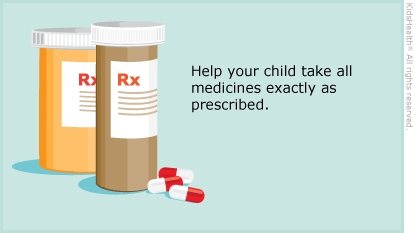Ulcerative Colitis: How to Care for Your Child
Kids with ulcerative colitis (UC) have inflammation (swelling and irritation) of the lining of the large intestines (also called the colon). UC causes belly pain, diarrhea, blood in the poop, low energy, and other problems. UC is treated with medicines, changes in diet, and sometimes surgery. Follow these instructions to help get your child's UC under control.


-
Be sure your child takes all medicines exactly as prescribed, including any vitamins or nutritional supplements.
-
Because some medicines used to treat UC make it harder to fight infections, it is important that your child has all vaccines recommended for his or her age. The health care provider may recommend a blood test to make sure that the vaccines are protecting your child.
-
Check with the care team before giving your child over-the-counter or herbal medicines. Never give your child ibuprofen (brand names include Advil® and Motrin®).
-
Follow the care team's instructions on healthy eating:
-
Help your child avoid foods that make symptoms worse.
-
Make any recommended changes in diet, such as eating small meals several times a day instead of three large ones.
-
Teach your child not to smoke or be around smokers.
-
Go to all follow-up appointments. Be sure your child gets all tests the health care team recommends.
-
Find ways for your child to deal with stress. Exercise, deep breathing, or talking to a counselor are good ways to cope.
-
Help your child find activities he or she enjoys. Encourage your child to talk with you and share his or her feelings about living with UC.
-
Tell teachers, the school principal, and school nurse that your child has ulcerative colitis. Explain that your child may need lots of bathroom breaks and might miss school at times.

Your child:
-
is not taking the prescribed medicines
-
does not want to eat or is losing weight
-
has new or worsening symptoms, such as diarrhea, blood in the poop, or belly pain
-
has a fever of 100.4°F (38°C) or higher
-
throws up more than once or twice
-
has hard or painful poops
-
has sores or drainage near the anus (the hole where the poop comes out)
-
has changes in vision, eye pain, or headaches

Your child:
-
has very bad belly pain
-
has a lot of blood in the poop
-
passes out or feels weak, lightheaded, or dizzy
-
is throwing up and can't keep anything down
-
appears dehydrated; signs include:
-
dizziness or drowsiness
-
a dry or sticky mouth
-
sunken eyes
-
peeing less often

What is UC? UC is caused by inflammation in the large intestine. This inflammation leads to sores called ulcers. The sores cause blood in the poop.
What are the signs of UC? Kids with UC may have belly pain, diarrhea, blood in the poop, weight loss, fever, tiredness, joint pain, eye problems, or skin rashes. When UC gets worse, it is called a flare (or flare-up). Remission is when the signs of UC get better. Although the symptoms of UC come and go, it is a lifelong condition.
Why do kids get UC? The body's immune system, which normally fights infections, makes a mistake and attacks the lining of the large intestine. The lining becomes inflamed and leads to the symptoms of UC. UC can run in families.
What tests are done to diagnose UC?
-
blood tests
-
checking poop for blood and certain germs
-
imaging tests, such as an MRI, CT, or X-ray to look inside the intestines
-
endoscopy or colonoscopy to look inside the digestive tract with a long tube connected to a tiny camera
-
a biopsy, where a small piece of tissue (for example, the lining of the intestine) is taken and sent to the lab for testing